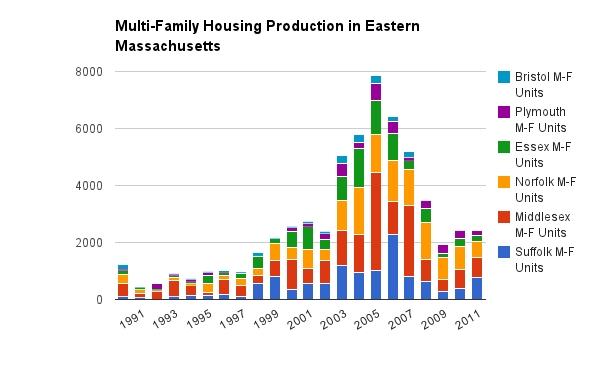INITIATIVES DESIGNED TO INCREASE HOUSING IN MASSACHUSETTS OUTLINED, SETS STATEWIDE GOAL OF 10,000 NEW MULTI-FAMILY UNITS PER YEAR
WORCESTER – Tuesday, November 13, 2012 – Committed to creating new housing that is vital to maintaining Massachusetts’ young, well-educated base of talent, Governor Patrick today outlined initiatives designed to produce 10,000 multi-family units of housing per year, the first production goal of this kind set by any state in the country.
“Access to housing for our middle- and moderate-income families is an important component in the Commonwealth’s continued growth to retain and build our young and innovative workforce,” said Governor Patrick. “By working to strengthen and expand our current initiatives and through greater collaboration with organizations and agencies across the Commonwealth, we aim to produce 10,000 multi-family housing units annually. This will further support our state’s continued growth and economic competitiveness for generations to come.”
At “Under One Roof,” the Commonwealth’s first Housing and Community Development Conference in more than a decade, Governor Patrick detailed the new Compact Neighborhoods program, designed to encourage and create well-planned housing that fulfills the demand for homes near jobs, transit and the vitality of city and town centers.
Compact Neighborhoods complement smart-growth programs by providing incentives to encourage residential development near transit and town centers. The program will recognize communities planning ahead systematically for economic and housing growth, and will offer Chapter 40B relief and priority consideration in discretionary funding programs, such as the MassWorks Infrastructure Program.
Also today, Lieutenant Governor Timothy Murray discussed the Administration’s commitment to preserving and strengthening affordable housing for residents, particularly veterans. The Lieutenant Governor, who chairs both the Interagency Council on Housing and Homelessness and the Governor's Advisory Council on Veterans' Services, noted a 21 percent decline in the number of homeless veterans over the last year, with the goal of lowering the number of homeless veterans (currently approximately 1,270) by 1,000 by 2015. The Lieutenant Governor also discussed the Administration’s reforms of the emergency assistance program, which is designed to increase investments in preventing homelessness and expanding permanent housing solutions while still providing a strong safety net for those who need immediate emergency housing.
"We are working strategically with our partners in the public and private sector to deliver more affordable housing solutions for individuals and families across the Commonwealth," said Lieutenant Governor Timothy Murray. "By setting targeted goals, we will work together to ensure resources are used effectively and efficiently to support housing resources and community development."
Increasing market-rate housing for families and individuals is part of the Patrick-Murray Administration’s comprehensive plan for improving housing at all levels. Along with creating new housing, the Administration has made significant investments in the Commonwealth’s public housing stock, by preserving and improving the 46,000 housing units in the system through increased capital funding, increased operating subsidies, and changes in management of those resources.
“Setting concrete goals is a major step forward that reinforces the strong connection between housing supply and economic prosperity in Massachusetts,” said Clark Ziegler, Executive Director of the Massachusetts Housing Partnership. “We strongly support the Governor’s goal and we hope the state’s business and civic leadership embrace it.”
Compact Neighborhoods joins a number of existing programs that are being expanded or re-funded in an effort to expand available options for cities and towns and help meet the goal of 10,000 new housing units per year. The goal figure was set after collaborating with the Metropolitan Area Planning Council and the Kitty and Michael Dukakis Center for Urban and Regional Policy at Northeastern University.
This includes the Chapter 40R tool, which similarly to Compact Neighborhoods promotes smart-growth districts. Last month, Reading officials opened a mixed-use project in the downtown area that was supported by Chapter 40R funding, which was replenished by $4 million dedicated to the program in the jobs bill signed by Governor Patrick in August.
Also expanded in the jobs bill is the Chapter 43D program, which will support prompt and predictable residential permitting. Some communities, like Groton, have used Chapter 43D to support housing production that provides a variety of housing types for residents.
Last month, Governor Patrick announced the first Housing Development Incentive Program (HDIP) district, in Pittsfield. Specifically designed for Gateway Cities, the HDIP program is a development tool for increased residential growth and expanded diversity of housing stock. The program offers incentives to developers through a local-option real estate tax exemption and a state tax credit for 10 percent of eligible costs, up to $1 million.
The “Under One Roof” conference is a full-day, statewide event focused on housing issues across a broad range of issues, including emergency housing assistance, the Commonwealth’s public housing program that is one of the strongest in the nation and the plans to grow the state’s housing stock. Approximately 1,000 people attended the conference, which included sessions hosted by prominent state, non-profit and private-development housing leaders.

